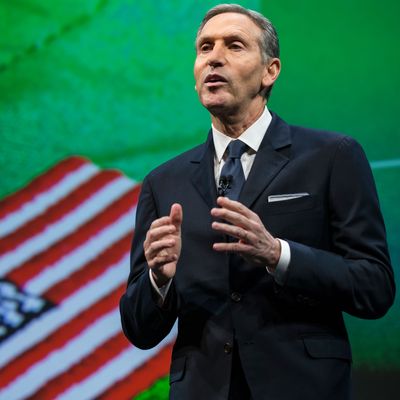
Last weekend, Maureen Dowd floated two possible names as late entrants into the Democratic presidential primary. The first, Joe Biden, briefly set campaign journalists alight with speculation. The second, Howard Schultz, attracted no attention whatsoever. Nonetheless, Schultz feels compelled to write a New York Times op-ed today disclaiming any intention to run.
According to Dowd, Schultz, the CEO of Starbucks, “has strong opinions, and even position papers, about what he calls the fraying American dream.” Schultz’s op-ed appears to be designed to refute that. Given nearly 800 words of precious Times real estate in which to outline his vision of America, Schultz confines himself to vacuous platitudes about bringing America together. “I know candidates want to play to the party faithful during the primary season, but the challenges facing us today are too dire for another status-quo election,” he “argues.” “We cannot afford more false promises, slogans, theatrics and fool’s gold.” These strong opinions are not going to sit well with people who support false promises, slogans, theatrics, and fool’s gold.
Schultz does venture one firm opinion in his column. Unfortunately, it is false. “Save for the most rabid partisans,” he writes, “most people don’t want one-party rule.” In fact, a huge and growing majority of the electorate votes for one party to control the entire government. Merely because the votes are distributed in such a way that neither the nearly half of America that wants Republicans to control everything nor the nearly half of America that wants Democrats to control everything can obtain a functional majority does not mean a majority likes it this way.
Schultz’s idée fixe is that the proper combination of hectoring and thoughtful conversation will yield a popular movement that will force both parties to come together and enact Barack Obama’s proposed legislative agenda. In 2011, he led, or attempted to lead, a group of business leaders who would pledge to withhold campaign contributions from both parties until Washington had enacted the balanced deficit-reduction plan that Obama had sought without success to get Republicans to support. In 2012, he gave up on the campaign-donation boycott and tried instead to pass the debt-reduction plan by having baristas in Washington write “come together” on coffee cups. Building on the success of that campaign, earlier this year he had baristas write “race together” on cups to initiate conversations about race.
In an odd way, Schultz provides the Democratic counterpoint to the Donald Trump phenomenon. Both have a populist vision, lacking in specifics, in which the American people are fundamentally unified. Both are wealthy businessmen filled with the conviction that their corporate success gives them the ability to solve political stalemates that have eluded elected officials. The mystery ingredient in Schulz’s formula is the coffee klatch, whereas for Trump, it is Trump himself. Of course, Trump is a celebrity, which gives him a base of supporters, whereas Schultz has no plausible base.
Schultz demands, in his op-ed, “Americans who are tired of politics as usual should demand a clear answer to a simple question from every candidate: What will you do to unite all of us?” Frustratingly, Schultz does not use his own op-ed to supply the answer. Probably it involves writing “[something] together” on coffee cups.






























